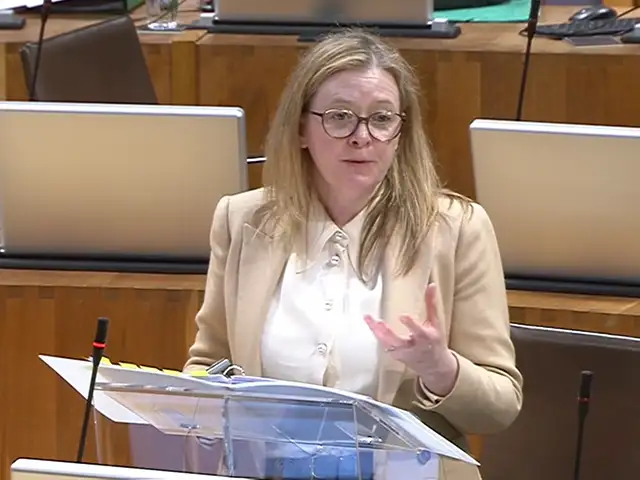SENEDD Members welcomed a bill aimed at ending homelessness in Wales but warned of missed opportunities to support veterans, prisoners and those discharged from hospital.
Jayne Bryant gave a statement on the introduction of the homelessness bill which aims to increase access to services and prioritise social housing for those most in need.
With around 11,000 people currently housed in emergency temporary accommodation, Wales’ housing secretary told the Senedd: “Across Western Europe and beyond, homelessness poses an escalating and urgent challenge.
“It is a devastating and pervasive issue. It shortens lives and isolates people from their communities. It impacts people’s health, mental wellbeing, people’s ability to engage in work or with the economy, or indeed on educational outcomes.”
Ms Bryant, who is also responsible for councils, said the pandemic revealed a hidden homelessness need, placing unsustainable pressure on households and services.
“This is why reform is absolutely necessary,” she said, describing the “landmark” bill as an important step towards a bold vision of a Wales free from homelessness.
She explained that the bill, “which is rooted in evidence and experience”, will move away from a system that responds to crises to one focused on early identification and prevention.
She said the priority need and intentionality tests for homelessness support – which have been criticised as “unjust and immoral” for setting a high threshold – will be abolished.
Ms Bryant was particularly proud of a new duty in the bill on councils to take reasonable steps to secure suitable accommodation for young people transitioning from care.
“These reforms are ambitious,” she said. “They have to be to match the scale of the challenge. They will take time to implement. This is not a quick fix.”
Laura Anne Jones, the Conservatives’ shadow housing secretary, broadly welcomed the “much-needed” reforms, particularly the commitment to care leavers.

But she expressed concerns about ministers not taking forward proposals to specifically support those leaving hospital or custody – “two of the most high-risk groups”.
“Ignoring these proposals misses a vital opportunity for a joined-up approach,” she warned.
Ms Jones asked: “What message does that send, that support for people leaving NHS care or prison has been dropped from our most significant homelessness reforms in years?”
She added: “While we support these reforms, let’s not pretend they solve the deeper crisis that we face… the chronic shortage of social housing in Wales.”
She called for radical levels of investment to deliver desperately needed housing, pointing out that the Welsh Government is set to miss its target of 20,000 social homes by 2026.
Ms Jones raised concerns about an Audit Wales report, which suggested between £580m and £740m extra could be required to deliver on the target.
Calling for an exemption, she warned that the local connection test for support could discriminate against veterans who may not live near family nor friends.
“We all owe them a debt, not just local communities,” she said, pointing out that the UK Government removed the local connection rule for veterans in England.
Ms Bryant argued that ensuring nobody is discharged from hospital into homelessness can best be achieved by using existing mechanisms rather than creating a new duty.
She said guidance will be introduced to stop people being discharged onto the streets or stuck in hospitals due to a lack of suitable housing.
Ms Bryant agreed the bill must be underpinned by an increased supply of social homes, with a record £2bn set to be invested from 2021 to 2026.
Turning to veterans, she said the bill provides powers for ministers to reconsider certain elements including problems associated with the local connection test.
Ms Bryant told the Senedd her officials are working on regulations to stop veterans being “pushed down the list for social housing just because they do not have a local link”.
The bill was part of the now-collapsed cooperation agreement between the Welsh Government and Plaid Cymru in return for support to pass budgets.
Siân Gwenllian, Plaid Cymru’s shadow housing secretary, welcomed the trauma-informed, person-centred approach taken in the bill.

She said: “We have to confront the situation… because the figures on homelessness today are truly staggering. There are more than 11,000 people in temporary accommodation, including over 2,600 and 400 children living in B&Bs or hotels.
“At the moment, we are letting the most vulnerable people down – with one in four young care leavers homeless, so I am pleased to see this bill focusing on those at particular risk.”
Warning of a lack of social housing, Ms Gwenllian told the Senedd: “You as a government have to recognise that you have entirely failed to meet your own targets.”
Ms Bryant stressed: “Legislation alone can’t end homelessness… we do recognise that supply and social housing has a really important role to play.”
Closing her statement on May 20, the Labour minister said: “This is a government that cares about the future of Wales – a future where homelessness is confined to the history books. These reforms take us closer to realising that vision.”
















